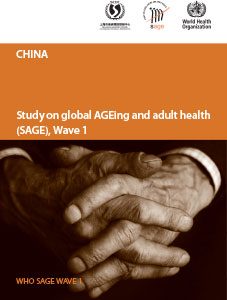WHO Study on global AGEing and adult health (SAGE)
World Health Organization, 2015

SAGE is a longitudinal study collecting data on adults aged 50 years and older, plus a smaller comparison sample of adults aged 18–49 years, from nationally representative samples in China, Ghana, India, Mexico, Russian Federation and South Africa.
Findings from a multi-country study in lower-middle and upper-middle income countries, covering over 40% of the world’s population aged 50+ years, have provided some intriguing insights, but also raise more questions:
- Why are older adults in China consistently reporting better health status and lower disability levels than compatriots in India?
- How does living in Ghana and South Africa contribute to higher levels of happiness in old age than in India?
- What are the factors that influence the associations between diabetes, gait speed and cognitive function in Mexico and Russia?
The Study on global AGEing and adult health (SAGE) is part of a Longitudinal Survey Programme in WHO’s Multi-Country Studies unit. The main SAGE surveys compile comparable longitudinal information on the health and well-being of adult populations and the ageing process from nationally representative samples in the following six countries:
Each country’s national report is a descriptive summary of results, including this report of SAGE Wave 1. Wave 2 follow-up has been implemented in China, Ghana and Mexico, with the remaining three countries to be completed by late 2015 and Wave 3 follow-up is planned to start in 2016. More information is available on the WHO website.


